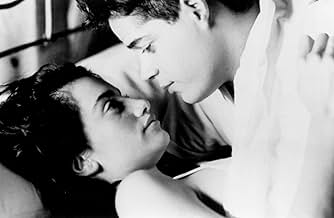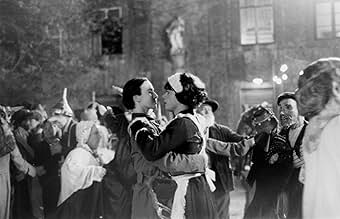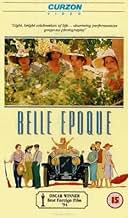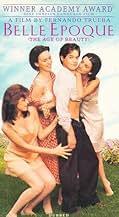NOTE IMDb
7,1/10
12 k
MA NOTE
En 1931, un déserteur espagnol se réfugie dans une ferme isolée jusqu'au jour où les quatre filles du fermier lui rendent visite et il tombe amoureux de chacune d'entre elles.En 1931, un déserteur espagnol se réfugie dans une ferme isolée jusqu'au jour où les quatre filles du fermier lui rendent visite et il tombe amoureux de chacune d'entre elles.En 1931, un déserteur espagnol se réfugie dans une ferme isolée jusqu'au jour où les quatre filles du fermier lui rendent visite et il tombe amoureux de chacune d'entre elles.
- Réalisation
- Scénario
- Casting principal
- Récompensé par 1 Oscar
- 25 victoires et 15 nominations au total
Joan Potau
- Paco
- (as Juan Potau)
Avis à la une
The plot, this is a movie about a straggler that is taken in by a local Spanish elder who happens to have 4 very beautiful and very single daughters. In the next hour, the straggler ends up having relations with all four daughters. The side story of the Spanish civil war and the relationship between the 4 sisters and their parents is simple background to the main plot of sexual desire and the tension that becomes to obvious to hide. A beautiful cast of people, the ending is somewhat sad, but true. A nice film, and surprisingly, no nudity? Still, it is a nice "sexy" film.
Comical (farce at times), deeply human movie about an army deserter who meets up with a kindly, old, artistic gent who offers him refuge. The deserter is packed up and ready to go, until the artist's four beautiful daughters arrive. This sets in motion a plot that will keep you laughing, dialogue that will keep you thinking and characters that will keep you entertained. The humor is not forced and the chuckle is at life's absurdities, politics, most of all, human nature. Momma's entrance into the story is unique and melodic, to say the least. The movie is kind of kooky and not a by-the-numbers flick, and a satisfying watch. Sidebar: It did get the Oscar nod for Best Foreign Film.
Belle Epoque is a light, wistful romantic comedy, easy to watch, and easier to love. It is set in glorious pre-Franco Spain and is as beautifully filmed as it is written and acted.
The story entails (in a nutshell) a young army deserter who befriends an older man who is an artist and a self-proclaimed anarchist. The old man has four beautiful daughters and film carries you along as our young hero falls in love with each in order.
Belle Epoque is one of those rare gems that does not stray from its purpose - to be a celebration of love and romance and comic tale of a young soldier controlled by his libido. No violence, car chase scenes, drippy pre-packaged morality plays - just plain fun.
If you have not tried watching a sub-titled movie or have had little exposure to foreign films, start here. Belle Epoque is the best film I have seen out of Spain and an all-time personal favourite.
***1/2 out of ****.
The story entails (in a nutshell) a young army deserter who befriends an older man who is an artist and a self-proclaimed anarchist. The old man has four beautiful daughters and film carries you along as our young hero falls in love with each in order.
Belle Epoque is one of those rare gems that does not stray from its purpose - to be a celebration of love and romance and comic tale of a young soldier controlled by his libido. No violence, car chase scenes, drippy pre-packaged morality plays - just plain fun.
If you have not tried watching a sub-titled movie or have had little exposure to foreign films, start here. Belle Epoque is the best film I have seen out of Spain and an all-time personal favourite.
***1/2 out of ****.
10Johnny B
Belle Epoque is one of those movies you don't see every weekend at the theatre. It is a film set in a certain age (in this case: Spain during the times of the civil war), where the age itself is not very important, but it effects the way the story evolves. The best thing of all in this film is the acting and the comedy. The farce is excellent - hardly ever seen a film with such intelligent humourism. The first time I saw the film was in Spanish and I laughed my guts out (even though I do not know Spanish a lot ). The story too is not too complicated and at the same time it is not at all banal. The highlight of the film, in my opinion, is when the wife of Manolo goes to visit him and starts singing an aria from some opera. Some of the comic highlights of this movie are when Rojio is asked to try her mother-in-law -to-be's wedding dress and when Juanito enters her bed. The best quote from the film is Clara's: "A Woman cannot stay without a man, especially at night." Anyway, just about everything about this movie is great. Well, in short, WATCH IT
Belle Epoque has many layers. At it's core is a romance which is surrounded and disguised by a classic sex farce that is itself enveloped by a philosophical tale all wrapped up in a bittersweet historical setting. Spain is, as throughout it's history, in a political struggle. In this case, a battle between the dying monarchy and the emergent republic which is,as these things go, a mild one leaving most Spaniards to enjoy their lives during this "Belle Epoque". Those familiar with it's history know that this is the short calm before the storm of the Spanish Civil War in which the Republic is replaced by the Fascist dictatorship of Franco through a bloody war. My favorite setpiece is the dance where Violeta wears Fernando's uniform and dresses him in a ball gown and wig; the rest must be seen to be believed! A lovely film! And why the devil isn't it on DVD!?
Le saviez-vous
- AnecdotesWhen accepting his Academy Award for Best Foreign Language Film, director (Fernando Trueba) said: "I would like to believe in God in order to thank him for this prize, but I only believe in (Billy Wilder), so... Thank you, Mr. Wilder!". Wilder himself reportedly phoned Trueba a few days later for acknowledgment and told him: "Hello Fernando, I'm God".
- GaffesAmalia sings "En un pais de fábula" from Pablo Sorozábal's zarzuela "La tabernera del puerto". The situation of the movie is in early 1930s, whereas this zarzuela was first staged in 1936.
- Bandes originalesEn un país de fábula
(from La tabernera del puerto)
Written by Pablo Sorozábal (as Pablo Sorozabal), Guillermo Fernández Shaw and Federico Romero
Performed by Mary Carmen Ramírez
Meilleurs choix
Connectez-vous pour évaluer et suivre la liste de favoris afin de recevoir des recommandations personnalisées
- How long is Belle Epoque?Alimenté par Alexa
Détails
- Date de sortie
- Pays d’origine
- Site officiel
- Langues
- Aussi connu sous le nom de
- Belle Epoque
- Lieux de tournage
- Arruda dos vinhos, Lisbonne, Portugal(Quinta do Bulhaco: Manolo's estate at 38°56'55"N, 9°03'51"W)
- Sociétés de production
- Voir plus de crédits d'entreprise sur IMDbPro
Box-office
- Montant brut aux États-Unis et au Canada
- 5 418 216 $US
- Montant brut mondial
- 5 418 502 $US
- Durée
- 1h 49min(109 min)
- Mixage
- Rapport de forme
- 2.35 : 1
Contribuer à cette page
Suggérer une modification ou ajouter du contenu manquant




































